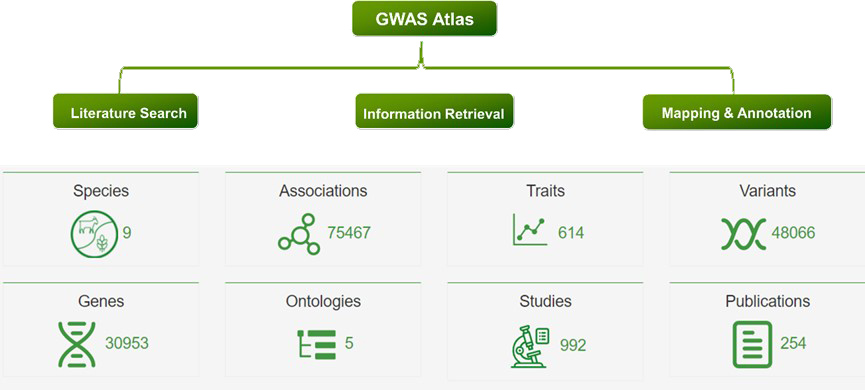Recently, the knowledge base of genome-wide variant-trait associations for plants and animals (GWAS Atlas) was officially published online, which is developed by the researchers of "biodiversity omics data platform and database system" in "biodiversity and ecological security" project. The research titled “GWAS Atlas:A curated resource of genomic -wide variant-trait associations in plants and animals” was published in the international journal of Nucleic Acids Research .
Genome-wide association analysis (GWAS) is a key technology to explore the genetic basis of complex biological traits, which refers to finding out the sequence variation in the whole genome and screening out the genetic loci related to diseases, phenotypic traits, etc.. With the rapid development of high-throughput sequencing technology, more and more high-quality genotype data is being produced for multiple species, and genetic loci associated with many complex traits of plants and animals have been analyzed. However, this knowledge and information is largely scattered in literature, which is not conducive for knowledge integration, mining and reuse. Therefore, the researchers of the national genomics data center organized the genotype-phenotype association knowledge of the major crops and livestock animals through key word retrieval, manual curation, comparison and annotation of entries, etc., and developed the first knowledge base of genome-wide variant-trait associations for plants and animals-GWAS Atlas.
The current release of GWAS Atlas features a comprehensive collection 75467 curated genotype-to-phenotype (G2P) associations for 614 traits across 9 species (7plants, including cotton, plum flower, corn, rapeseed, rice, sorghum, soybean, and 2 animals, including p goat and pig).In addition, all traits were mapped to five different trait ontologies (plant trait ontology PTO, livestock trait ontology ATOL, crop trait ontology CO, etc.) through semantic matching, which is convenient for users to find the traits of interest and the corresponding G2P information through the ontology-based hierarchical structure. Moreover, the researchers also analyzed and defined pleiotropic gene and genetic loci associated with multiple traits, enabling users to browse, retrieve and download them online through different modules.

GWAS Atlas, as the first comprehensive multi-species knowledge base for variation-trait associations, is an extension of the genome variation map (GVM),serving as a valuable resource for genetic research of important traits and breeding application.

